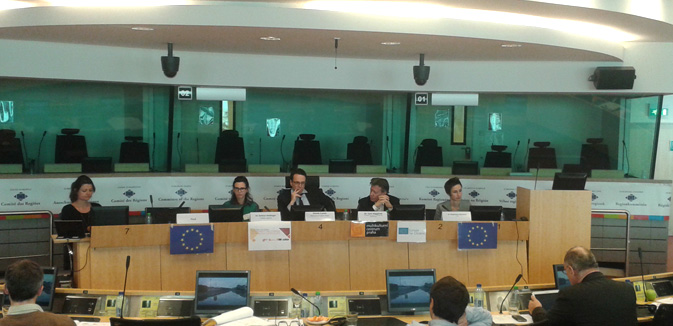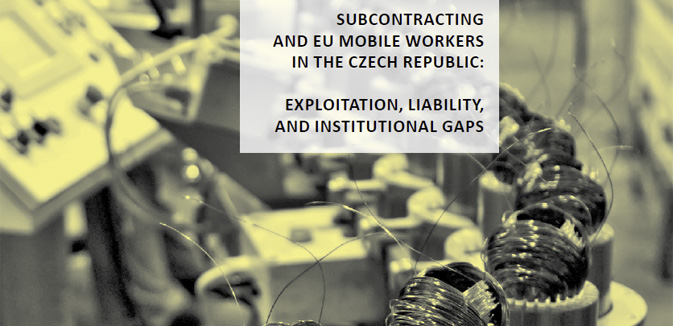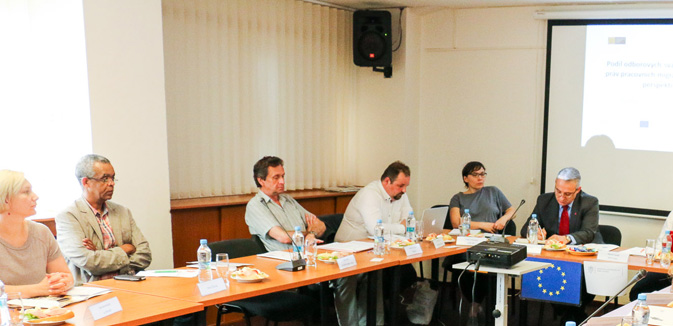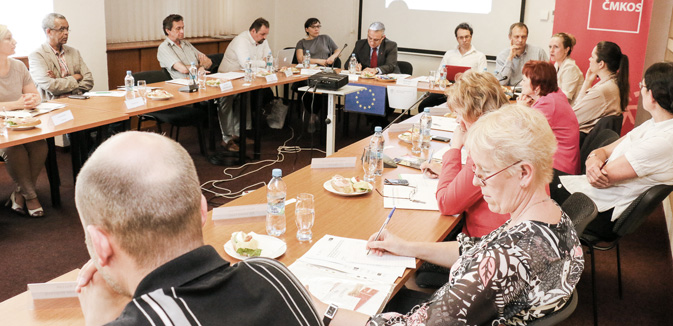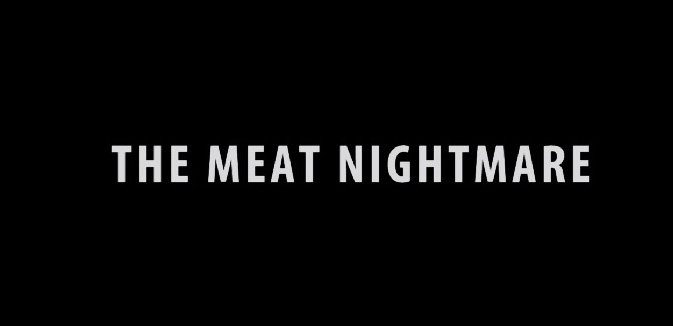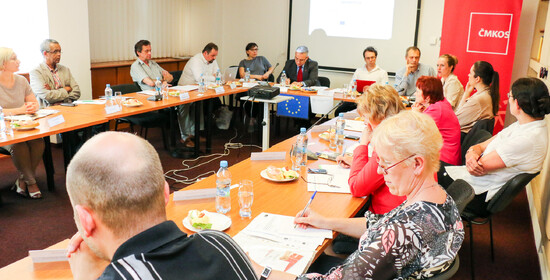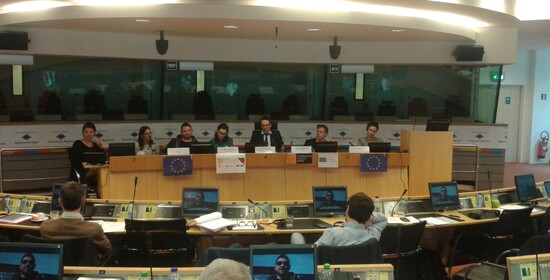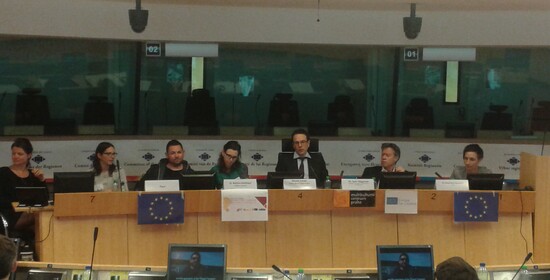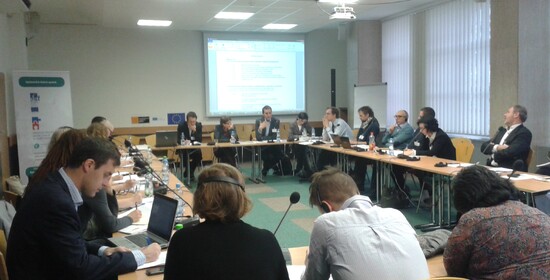Ústřední aktivitou byla závěrečná konference, která proběhla v pondělí 4. dubna v Bruselu v budově Evropského výboru regionů konference Labour mobility and citizenship safeguarding social standards in Europe pořádaná Multikulturním centrem Praha a bruselskou sítí NNO Solidar. Hlavním tématem bylo porušování pracovních práv občanů EU, mobilita a sociální dumping. V rámci konference byly prezentovány studie z České republiky, Německa, Itálie, Rumunska a Litvy, které jsou součástí projektu Labour Citizenship - Pracovní občanství (dále LABCIT), spolufinancovaného z programu EU Evropa pro občany. Celkově se v rámci projektu vedly rozhovory a konzultace s více než 250 pracovníky a odborníky.
Dále probíhaly v partnerských zemích přípravná setkání (preparátory events), hearingy I i II a další akce, které navazovaly na bruselskou konferenci.
Níže naleznete výčet aktivit v jednotlivých zemích (vše v anglickém jazyce).
Přípravná setkání
Italy
University of Padua
As part of the “Testing EU Citizenship as Labour Citizenship: From Cases of Labour Rights Violations to a Strengthened Labour-Rights Regime” project sponsored by Europe for All Citizens Programme, the University of Padua has carried out several preparatory activities. In particular, meetings with migrants (both EU and non-EU citizens) employed in the hospitality industry of the so-called “Riviera Romagnola” and in warehouses in the city of Padua were organized. The aim of the meetings was not only to map the widespread abuses in the workplace but also to understand which strategies and practices workers put in place to contrast such violations, and which support they receive from institutions and other social organizations. Privileged witnesses such as trade unionists, activists of solidarity associations, health inspectors, and other key informants have also been met. The focus of the interviews concerned the workers’ work and life conditions, cases of severe labour exploitation, the type of migration and the means of access to justice and citizenship rights.
Both sectors are characterized by the employment of a high number of migrant workers and by a strong internal stratification. In the first case, we have deepened the role of international recruitment agencies. These agencies are an important factor that determines the degree of “workers' freedom” and the level of exploitation. In the second case, the logistics sector, we analyzed the role of cooperatives and outsourcing processes. The subcontracting of services allows the parent company to shift its risks onto another, to take advantage of a low labour cost and, as the workers argued, it makes it difficult to identify the workers’ counterpart.
The interviewed workers reported serious cases of exploitation and labour-rights violations. The most common are: excessive working hours, forced and unpaid overtime, wage theft, non-application of the collective bargaining agreements, threats and psychological harassment at work, and wages below the legal minimum. In Hearing II, we plan to discuss those issues together with workers and labour rights experts, with the main objective to outline good practices and potential solutions and recommendations.
Lithuania
Diversity Development Group
During the implementation of the LABCIT project, Diversity Development Group performed several preparatory activities. The purpose of these activities was to find and collect labour rights violation cases, identify workers who are willing to share their experiences and input with us in Hearing II, as well as to study and understand the importance of European citizenship for the workers. These cases revealed the reality of working in the European Union and helped us in identifying difficulties European citizens – specifically Lithuanian citizens – are facing as labour migrants.
In particular, the cases reveal that the selection of emigration destination from Lithuania is influenced by the presence of friends/family who already live in the destination country or by the presence of Lithuanian communities in those areas. Two patterns of arriving to the destination can be distinguished: a) workers sign work agreements in Lithuania before leaving and the employer is responsible for covering their travel and accommodation or b) the workers arrive to the destination country and search for employment opportunities on their own. In most of the cases we encountered, workers performed labour in the service sector (restaurants, cafes, nursing-homes) or various food production factories. The most common labour rights violations that the workers are reporting include: unpaid wages, overtime hours, abusive management, involvement in illegal activities such as opening fake bank accounts and money laundering. In order to obtain a deeper understanding of the difficulties faced by the migrant workers, individual meetings with experts from various organizations were held including the labour union “Solidarumas”, Caritas Human trafficking project, a men’s crisis center, and a women’s information center, where we discussed emigrant profiles and reasons of emigration.
In Hearing II, we plan to discuss identified issues with the project partners, look for good practices and potential solutions in the partner countries by categorizing labour migration issues into three phases: pre-migration, migration, return.
Slyšení I
As part of the “Testing EU Citizenship as Labour Citizenship: From Cases of Labour Rights Violations to a Strengthened Labour-Rights Regime” project co-funded by the European Union under the Europe for All Citizens Programme, 5 partner countries including Czech Republic, Romania, Italy, Lithuania and Germany, are Hearings with migrant workers from various economic sectors.
Through these Hearings and debates we managed to gain a preliminary idea of how workers see and experience their “labour citizenship”, and where the gaps between their experiences of exploitation and rights as working European citizens lie. On the basis of these Hearings the same partner countries and organizations will hold a second round of hearings with not only migrant workers, but also policy makers and stakeholders, in order to discuss the best possible policies and recommendations.
Czech Republic
Multicultural Center Prague
The Multicultural Center Prague held a Hearing with two groups of mostly EU-citizens as well as some non EU- citizens working in the Czech Republic and inquired about their experiences as mobile EU workers in various economic sectors, including construction, welding, manufacturing and tourism. Emphasis was placed on their working conditions, cases and issues of exploitation, labor rights violations, as well as on the role of law and regulatory institutions in ensuring the workers’ rights as EU and non-EU citizens.
The interviewed workers reported serious cases of exploitation and labour-rights violations. For example, many workers in the tourism sector and the manufacturing industry were not given any contracts upon employment. In addition, some of the workers in the welding industry were promised “free food and housing”, but none was provided, nor did they have access to medical insurance. Methods of addressing these violations included approaching the police who argued that a conflict over payment is not their area of intervention and recommended filing a case legally. The workers were further threatened and subjected to physical violence from the employer when they sought the police’s help.
The hearing was followed by a public meeting in MKC’s premises in which various workers met with a lawyer to ask for legal advice on labor rights and regulations. The discussions centered on the impossibility of seeking justice for violated working rights. The justice system is costly and complicated especially if one is a not a citizen in the country in which they are employed. The suggestion was proposed to enhance the role of a state authority or office such as labour inspection in enforcing sanctions against abusive employers and in helping the employees file their cases and obtain their rights. The judiciary is not flexible enough in terms of costs and time, but labor inspections can become more effective.
All suggestions were recorded and MKC is currently holding meetings with lawyers and labour rights experts to study possible policies and tangible recommendations, which we will discuss in Hearing 2.
Romania
Conect Association
Conect Association held the first hearing with mostly Romanian workers that had experienced working abroad for a limited period of time, in countries like Germany, UK, Spain and Italy and in sectors related to construction, agriculture and domestic care. Also, we initiated discussions with non-EU workers that had experienced working in similar sectors of the economy, thus trying to obtain a better perspective on the labor experiences of Romania’s emigrants and immigrants.
During the hearings we have focused particularly on issues such as:
- Ways of finding jobs abroad (recruiting companies, personal connections, etc.)
- Type of contracts, guarantees and provisions that the workers were promised and the conditions they were offered in the field.
- Exploitation mechanisms (chains of subcontractors, lack of access to social benefits, improper working conditions, delays in payment, etc.)
- Support mechanisms for the workers that are reporting exploitative work conditions abroad (the role and involvement of trade unions, public institutions, embassies, NGO’s, web platforms, activist support groups)
- Legal issues and practices that are limiting the possibilities for investigating labor exploitation mechanisms (the workers cannot check if their contracts are registered, public institutions have very limited attributions, etc.)
Some of the workers talked about serious cases of labor exploitation, for example working without a contract, up to 12-14 hours/day, sleeping in improper conditions or not being provided with accommodation at all, being locked during controls from the labor inspection, not being offered medical care when needed, etc. Some of the victims of such situations have addressed the legal mechanisms and are now part of the trials against the ones that hired them, by denouncing the chain of subcontractors that is favoring such contexts as well. On the other hand, other workers chose to add these experiences to the endless list of similar stories, considering that getting involved in a trial against the employee or the recruitment agency would be too consuming and they would need to find other employment opportunities. The precarious situation of many workers is forcing them to accept jobs that do not offer any guarantees, and as some of them explained: “we are counting on luck, each time we hope that it will be ok”. Other workers consider that such experiences are making them more aware of the minimum conditions that they should check before accepting such jobs and also of the legal means that they can access in order to denounce cases of labor exploitation.
As part of Hearing I, we have initiated and renewed some connections with some trade unions, the labor inspections, NGOs that are working in the field of human trafficking (investigating cases of severe labor exploitation), as well as with some academics and activist groups that are supporting workers. These, together with some of the workers that shared their stories with us during Hearing I, will be invited to participate in Hearing II, which will take place in December 2015.
Germany
Polnischer Sozialrat
As part of its activities in Hearing1, Polska Rada Spoleczna held a meeting with workers of Polish citizenship who had worked or were still working at a meat processing plant. The participants were interviewed about their current working and living conditions as well as their reasons for seeking work in Germany. Special attention was paid to cases of exploitation, labor rights violations and discrimination. Experiences with the authorities and regulatory institutions were also recorded.
The workers reported serious exploitation and labor rights violations. Most commonly mentioned was the hard work, the lack of proper tools and introductory training. Usually the workers worked long hours and night shifts without extra pay for the night shifts. Injuries or health problems were prevalent. Another issue frequently described was housing. The rooms rented from the employer were described as derelict. Any breach of rules or attempt to speak up was met with severe consequences ranging from monetary punishments to physical and verbal abuse. Most of the workers reported being scared or feeling threatened by their (former) employer. Therefore, none of the interviewees agreed to show their face on photo or film made by PRS for documentary purposes.
As part of the event two short lectures were given: one on labor legislation and contracts and one on German institutions and authorities. These were supposed to help the participants in handling legal proceedings arising from their current or former employment and/or life in Germany as well as to protect themselves against further violations of their rights. Following the meeting, the participants were given the opportunity to ask detailed questions concerning their individual difficulties and get legal advice. It became apparent that many of the workers had little knowledge of the German legal system or labor rights. Also much evidence was given for the inability of the German institutions or authorities to adequately address the perceived needs of the interviewees.
The meeting was recorded by a camerawoman as well as an assistant. The results will be reviewed and used to develop tentative recommendations as well as identify possible participants for the Hearing II from the pool of interviewees.
Slyšení II
As part of the “Testing EU Citizenship as Labour Citizenship: From Cases of Labour Rights Violations to a Strengthened Labour-Rights Regime” project co-funded by the European Union under the Europe for All Citizens Programme, five partner countries including Czech Republic, Romania, Italy, Lithuania and Germany, have held a second round of Hearingsinvolving policy makers, state representatives, migrant workers, and other stakeholders.
The second round of mostly-public hearings comes as a continuation of the first set, and aimed to push forward the identified cases and issues of labour rights violations with associated local stakeholders, using expert help and input. After identifying some of the key gaps between workers’ experiences of exploitation and their rights under local and EU law, especially with regards to mobility, the second hearings pushed for a deeper understanding of such abuses as systemic, and envisioned possible solutions and recommendations.
Shrnutí zpráv ze slyšení (v anglickém jazyce)
Czech Republic
Partner: MKC, Czech Republic
Location: Public Defender of Rights Office (Ombudsman), Brno
Date: November 27 and 28
Number of participants: 40
Lithuania
Partner: Diversity Development Group
Location: Vilnius, Lithuania
Date: 29 and 30.10.2015
Number of participants: 35
Italy
Partner: University of Padua
Location: Padua
Date: 23 and 24 of October, 2015
Number of participants: 56
Germany
Partner: Polish Social Council, Germany
Location: Europäisches Informationszentrum, Berlin
Date: 4 and 5 December, 2015
Number of participants: 45
Romania
Partner: CONECT Association, Romania
Location: The Czech Center, Bucharest, Romania
Date: 11 and 12 December, 2015.
Number of participants: 30
Závěrečná konference v Bruselu
On Monday 4th of April 2016, SOLIDAR and its partner Multicultural Center Prague (MKC Prague) held a conference to present five country reports on labour rights violations from the LABCIT project and to present SOLIDAR’s vision of high social safeguards. The event aimed to promote fair labour mobility in the EU and to make a case for strengthening “labour citizenship”. The LABCIT project, “Testing EU Citizenship as Labour Citizenship: From cases of Labour Rights Violations to a strengthened Labour Rights Regime”, which is co-funded by the Europe For Citizens Programme of the European Union, joined together twelve partners from eleven countries to investigate cases of labour rights violations of mobile EU citizens. The project held several hearings and consulted with over 250 workers, labour experts, and civil society actors and stakeholders.
Policy brief
Aktivity navazující na konferenci v Bruselu
V České republice, Itálii, Německu a Polsku proběhla v návaznosti na bruselskou konferenci celá řada doplňujících akcí. Jejich výčet naleznete v anglickém jazyce níže.
Czech Republic
České akce, které navazovaly na záveřečnou konferenci naleznete zde
Poland
Partner: The Galician Foundation for Regional Development
Location: Państwomiasto, ul. Andersa 29, Warszawa
Date: July 1, 2016
Number of participants: 22
Germany
Partner: The Polish Social Council
Location: Polnischer Sozialrat e. V., Berlin
Date: July 2-3, 2016
Number of participants: 33
Italy
Roundtable with Trade unionists (Partner: University of Padua, Location: Casa Madiba, Rimini, Date: 15 July 2016, Number of participants: 18)
Discussions on Labour Rights (Partner: University of Padua, Location: University of Padua, Date: 21 June 2016, Number of participants: 15)
